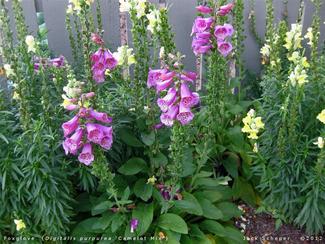by Vancouver Island Master Gardeners Association
Latin name: Digitalis purpurea
Common Name: Foxglove, Common Foxglove or Bloody Bells
Digitalis purpurea is a mainstay of many English gardens. This easy to grow biennial provides wonderful colour and texture and drama to the summer garden.
Blooming in early summer with purple to pink to white vertical spires, called racemes, it seems too invoke warm memories of years gone by. In more shady areas of the garden it provides colour and drama in addition to being easy to grow. Although this plant is a biennial, forming a rosette of leaves in its first season, once established flowers will appear each year. It is best grown as an annual from seed and should be deadheaded unless seedlings are desired.
Non-native species of digitalis purpurea for North America can become invasive under certain conditions, particularly Digitalis purpurea f. albiflora. Please plant with care.


| Attribute | Description |
|---|---|
| Form: | Stiffly upright habit with leaves forming a rosette at base in the first year. |
| Foliage type: | The leaves are alternate to each other as they grow and each leaf is elliptic, ovate or lance shaped. Leaves can be either dentate, or toothy or more ovate depending on the cultivar. |
| Height/ Width: | 5’ to 8’ (1.5-2.5 m) although some some cultivars are about 3’ to 5’ (1-1.5m) in height. |
| Hardiness Zone: | Zone 4. |
| Exposure: | Part sun/part shade. |
| Flower Colour: | Purple to pink to white spotted with maroon to purple within each pendant. |
| Leaf Colour: | Dark green foliage often with grey-white pubescent and glandular hairs that convey a woolly texture. |
| Flower Time: | June/July. |
| Preferred Soil & Watering: | Watering: Prefers rich, humus well drained soil. |
| Other: | No serious insect of disease problems. Powdery mildew and leaf spot can depreciate foliage considerably by early to mid-summer. Dense crowns may rot in soggy, poorly-drained winter soils. Potential insect pests include aphids, mealy bugs, slugs and Japanese beetle. Parts of this plant are poisonous if ingested. Chemicals taken from foxgloves are used to make a prescription drug called digoxin, commonly called digitalis although Digitalis lanata is the major source of digoxin in the US. Foxglove is most commonly used for congestive heart failure (CHF) and relieving associated fluid retention and irregular heartbeats. |
Photo credit: Plant Finder - missouribotanicalgarden and floridata.

